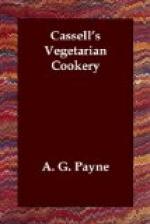If any liqueur is used, maraschino is best adapted to the purpose.
ORANGE FRITTERS.—Only first-class oranges are adapted for this purpose. Thick-skinned and woolly oranges are no use. Peel a thin-skinned ripe orange, divide each orange into about six pieces, soak these in a syrup flavoured with sugar rubbed on the outside of an orange, and if liqueur is used make the syrup with brandy. After they have soaked some time, remove any pips, dip each piece into hatter, and proceed as directed for apple fritters.
CREAM FRITTERS.—Rub some lumps of sugar on the outside of an orange, pound them, and mix with a little cream; take some small pieces of stale white cake, such as Madeira cake or what the French call brioche. Soak these pieces of stale cake, which must be cut small and thin, or they will break, in the orange-flavoured cream, dry each piece in some finely-powdered sugar, dip it into batter, and proceed as directed for making apple fritters.
GERMAN FRITTERS.—Take some small stale pieces of cake, and soak them in a little milk or cream flavoured with essence of vanilla and sweetened with a little sugar. Take them out, and let them get a little dry on the outside, then dip them in a well-beaten-up egg, cover them with bread-crumbs, and fry a nice golden-brown colour.
RICE AND GINGER FRITTERS.—Boil a small quantity of rice in milk and add some preserved ginger chopped small, some sugar, and one or more eggs, sufficient to set the mixture when baked in a pie-dish. Bake till set, then cut into slices about two inches long, an inch wide, and half an inch thick; dry these pieces with powdered sugar, dip into batter, and finish as directed for making apple fritters.
RICE FRITTERS.—A variety of fritters could be made from a small baked rice pudding, flavoured with various kinds of essences, spices, orange marmalade, peach marmalade, fresh lime marmalade, apricot jam, &c., proceeding exactly as directed above.
CHAPTER VII.
VEGETABLES.
SUBSTANTIAL VEGETABLES.
Vegetables may be roughly divided into two classes—those that may be called substantial and which are adapted to form a meal in themselves, and those of a lighter kind, which cannot be said to make a sufficient repast unless eaten with bread.
Potatoes were first introduced into this country about 400 years ago, tobacco being introduced about the same period, and we cannot disguise the fact that there are many who regard the latter as the greater blessing of the two. If Sir Henry Thompson is right in stating that tobacco is the great ally of temperance, there may be some ground for this opinion.
Potatoes form an important article of food for the body, while, whatever effect tobacco may have upon the thinking powers of mankind, it is almost the only product of the vegetable kingdom that is absolutely uneatable even when placed within the reach of those in the last stage of starvation.




